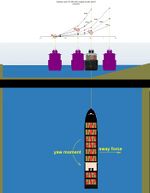Engineering:Bank effect
The bank effect (channel effect, bank suction, bank cushion, stern suction, ship-bank interaction) is the tendency of the stern of a ship to swing toward the near bank when operating in a river or constricted waterway.[1]
Phenomenon
The asymmetric flow around a ship induced by the vicinity of banks causes pressure differences (Bernoulli's principle) between port and starboard sides. As a result, a lateral force will act on the ship, mostly directed towards the closest bank, as well as a yawing moment pushing her bow towards the centre of the waterway. The squat effect increases due to the decreased blockage.
This phenomenon depends on many parameters, such as bank shape, water depth, ship-bank distance, ship properties, ship speed and propeller action. A reliable estimation of bank effects is important for determining the limiting conditions in which a ship can safely navigate a waterway.
Examples
It was cited as a possible cause of the 2021 Suez Canal obstruction by the cargo ship Ever Given.[1]
See also
- Physics:Coandă effect – Tendency of a fluid jet to stay attached to a convex surface
- Bernoulli's principle – Principle relating to fluid dynamics
- Continuity equation – Equation describing the transport of some quantity
- Physics:Squat effect – Effect of reduced pressure under a hull making way, causing a downward displacement
References
- ↑ 1.0 1.1 Greeley, Brendan (25 March 2021). "The bank effect and the big boat blocking the Suez". https://www.ft.com/content/171c92ec-0a44-4dc5-acab-81ee2620d3c1. Paywall
External links
- Model tests demonstrating the bank effect for International Conference on Ship Manoeuvring in Shallow and Confined Water (MASHCON) at Ghent University January 2010
- Bank Effects at Knowledge Centre, Manoeuvring in Shallow and Confined Water Ghent University
- MASHCON 1 : Bank Effects
- MASHCON 2 : Ship to Ship Interaction
- MASHCON 3 : Lock effects
- MASHCON 4 : Ship Bottom Interaction
- MASHCON 5 : waves, wind and current
- MASHCON 6 : Port Manoeuvres (May 2022)
 |



